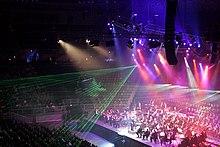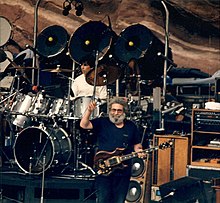Concert
This article needs additional citations for verification. (May 2009) |

A concert is a live performance (typically of music [further explanation needed]) before an audience. The performance may be by a single musician, sometimes then called a recital, or by a musical ensemble, such as an orchestra, a choir, or a musical band. Concerts are held in a wide variety and size of settings, from private houses and small nightclubs, dedicated concert halls, entertainment centres and parks to large multipurpose buildings, and even sports stadiums. Indoor concerts held in the largest venues are sometimes called "arena concerts" or "amphitheatre concerts". Regardless of the venue, musicians usually perform on a stage. Concerts often require live event support with professional audio equipment. Before recorded music, concerts would provide the only opportunity one would generally have to hear musicians play. Informal names for a concert include "show" and "gig".
Types of concert

The nature of a concert will vary by musical genre, the individual performers and the venue in which the concert is being played. Concerts by a small jazz combo or small bluegrass band may have the same order of program, mood, and volume, but vary in music and dress. In a similar way, a particular musician, band, or genre of music might attract concert attendees with similar dress, hairstyle, and behavior. For example, the hippies of the 60s often had long hair (sometimes in dread lock form), sandals and inexpensive clothing made of natural fibers. The regular attendees to a concert venue might also have a recognizable style, comprising that venue's "scene".
Theatrical

Some performers or groups put on very elaborate and expensive shows. In order to create a memorable and exciting atmosphere and increase the spectacle, the artist will frequently include additional entertainment devices within their concerts. These tend to include elaborate stage lighting; an image magnification (IMAG) system and/or pre-recorded video; inflatables, artwork or other set pieces; various special effects such as theatrical smoke and fog and pyrotechnics; and unusual costumes or wardrobe. Some singers, especially in genres of popular music, augment the sound of their concerts with pre-recorded accompaniment, back-up dancers, and even broadcast vocal tracks of the singer's own voice. Activities which may take place during these concerts include dancing, sing-alongs, and moshing. Some performers well known for including these elements in their performances include: The Flaming Lips, Cher, Alice Cooper, Daft Punk, Lady Gaga, Madonna, Pink Floyd, Jean Michel Jarre, Sarah Brightman and KISS.

.
Festivals
Concerts involving a greater number of artists, especially those that last for multiple days, are known as festivals. Unlike other concerts, which typically remain in a single genre of music or work of a particular artist, festivals often cover a broad scope of music and arts. Due to their size, festivals are almost exclusively held outdoors. New platforms for festivals are becoming increasingly popular such as Jam Cruise which is a festival held on a cruise ship, as well as Mayan Holidaze which is a destination festival held in Tulum. A few examples of the hundreds of festivals include the Big Day Out, Coachella, Falls Festival, Glastonbury Festival, Newport Jazz Festival, Oxegen, Parachute Music Festival, Rock In Rio, Rockwave Festival, Salzburg Festival, Summer Sonic Festival, Woodstock Music and Art Festival, Soundwave Festival, and the Warped Tour.
For a more complete listing of festivals from around the world, see: List of music festivals.
=== Concert tour ===<!-- this subheading is linked to from concert tour -->

A concert tour is a series of concerts by an artist or group of artists in different cities or locations. Often times concert tours are named, to differentiate different tours by the same artist and associate a specific tour with a particular album or product (for example: Michael Jackson's Bad tour). Especially in the popular music world, such tours can become large-scale enterprises that last for several months or even years, are seen by hundreds of thousands or millions of people, and bring in millions of dollars (or the equivalent) in ticket revenues.
Different segments of longer concert tours are known as "legs". The different legs of a tour are denoted in different ways, dependent on the artist and type of tour, but the most common means of separating legs are dates (especially if there is a long break at some point), countries and/or continents, or different opening acts. In the largest concert tours it is becoming more common for different legs to employ separate touring production crews and equipment, local to each geographical region. Concert tours are often administered on the local level by concert promoters or by performing arts presenters.
Revenue

While admission to some concerts is free, it is common practice to charge money for concerts by selling admission tickets. Historically, concerts were the primary source of revenue for musicians. Revenue from ticket sales typically goes to the performing artists, producers, venue, organizers and the brokers. In the case of benefit concerts, a portion of profits will often go towards a charitable organization.
Additional revenue is also often raised through in-concert advertising, from free local concerts for local sponsorships to sponsorships from corporations during major tours e.g. 2009's "Vans' Warped Tour Presented by AT&T". Both Vans and AT&T would have paid significant amounts to have their company names included at the forefront in all marketing material for the Warped Tour.
Concessions and merchandise are also often sold during and after concerts; often by the venue in the case of the former, and by the performing band or artist in the case of the latter.
As of 2011[update], the highest grossing concert tour of all time is U2 360 Tour, with gross revenues of $736,137,344.<ref name="wrap">Waddell, Ray (29 July 2011). "U2 Set to Wrap Biggest Concert Tour Ever". Billboard.com. Retrieved 31 July 2011.</ref> The second highest grossing concert tour of all time is The Rolling Stones' A Bigger Bang Tour which earned approximately $558 million in between 2005 and 2007.<ref name="biggerbang">Pietrolungo, Silvio (April 9, 2007). "Rolling Stones Tour Grosses More Than Half A Billion". Billboard. Retrieved 2009-11-17.</ref> The highest earning tour by a solo artist is the Sticky & Sweet Tour by pop superstar artist Madonna, which earned $408 million in 2008 and 2009.<ref name="stickysweet">"Madonna Closes Tour In Tel Aviv;Second Highest Grossing Trek Of All Time". Billboard. September 2, 2009. Retrieved 2010-09-01.</ref>
See also
- Benefit concert
- Guerrilla gig
- House concert
- List of highest-grossing concert tours
- Live PA
- Performing arts presenters
- Rave
- Recorded live track
- Rehearsal
- Rock concert
- Rock festival
- Smoking concerts
